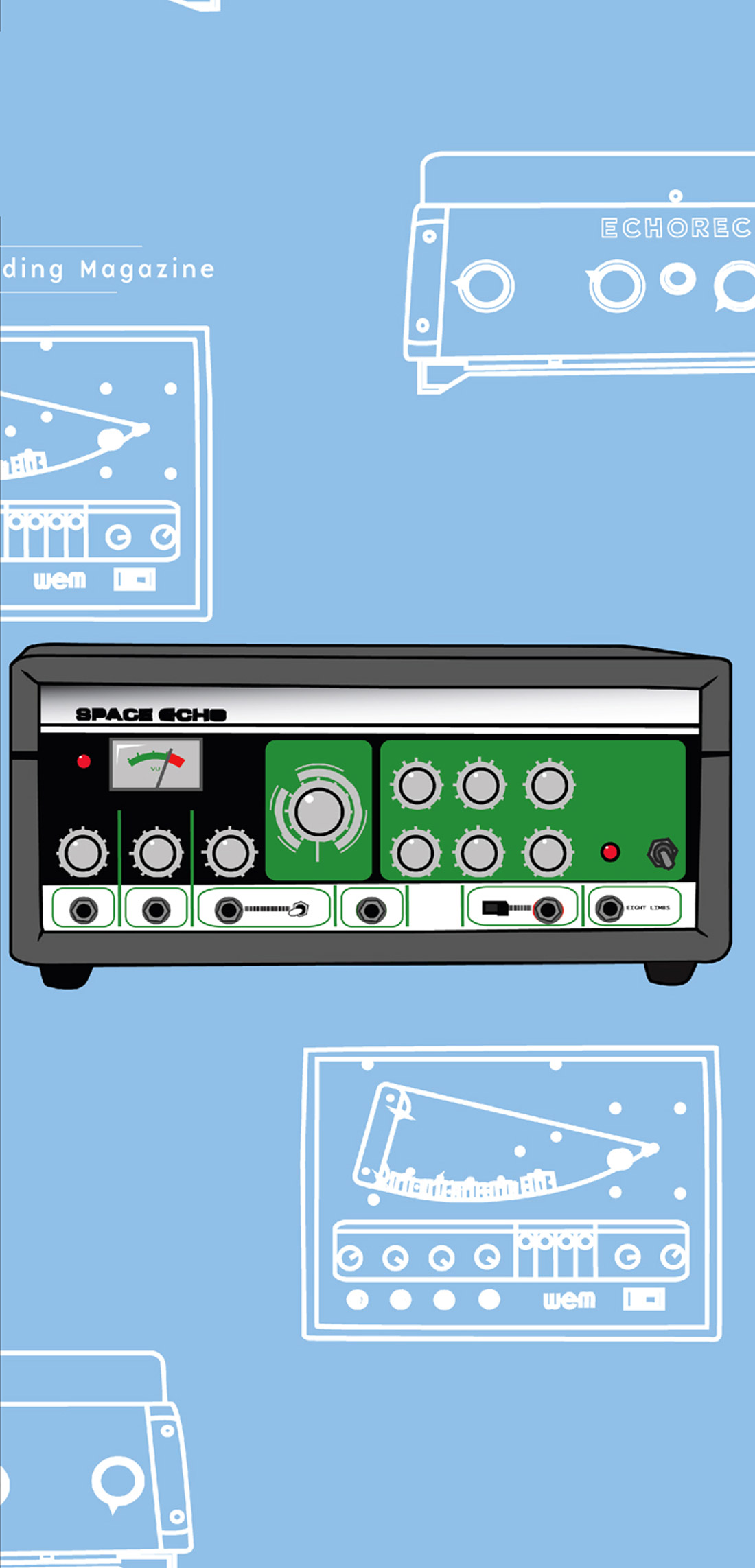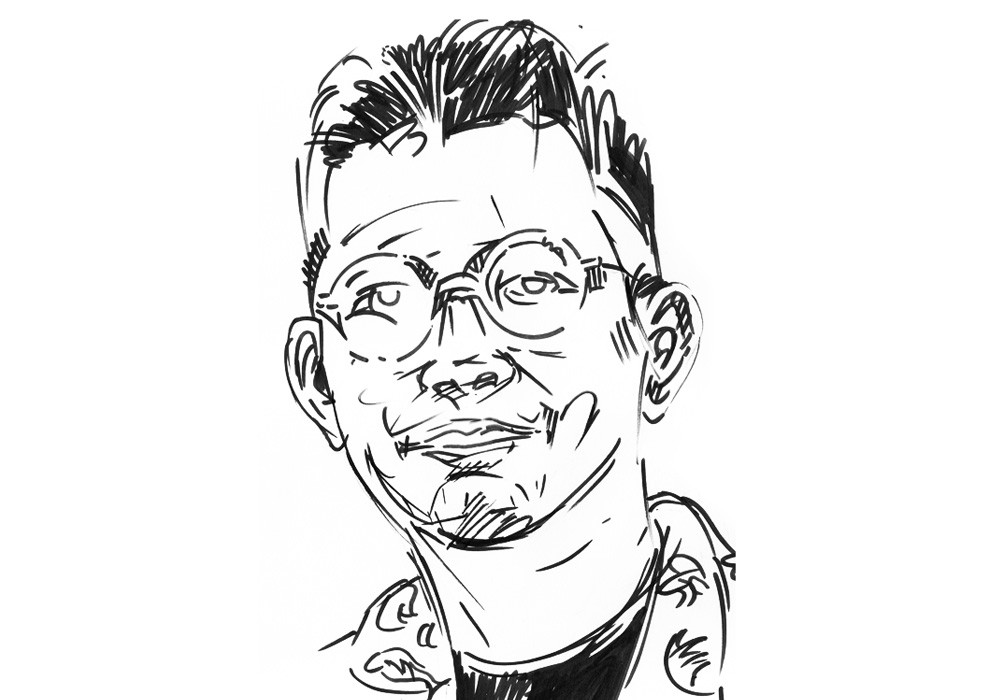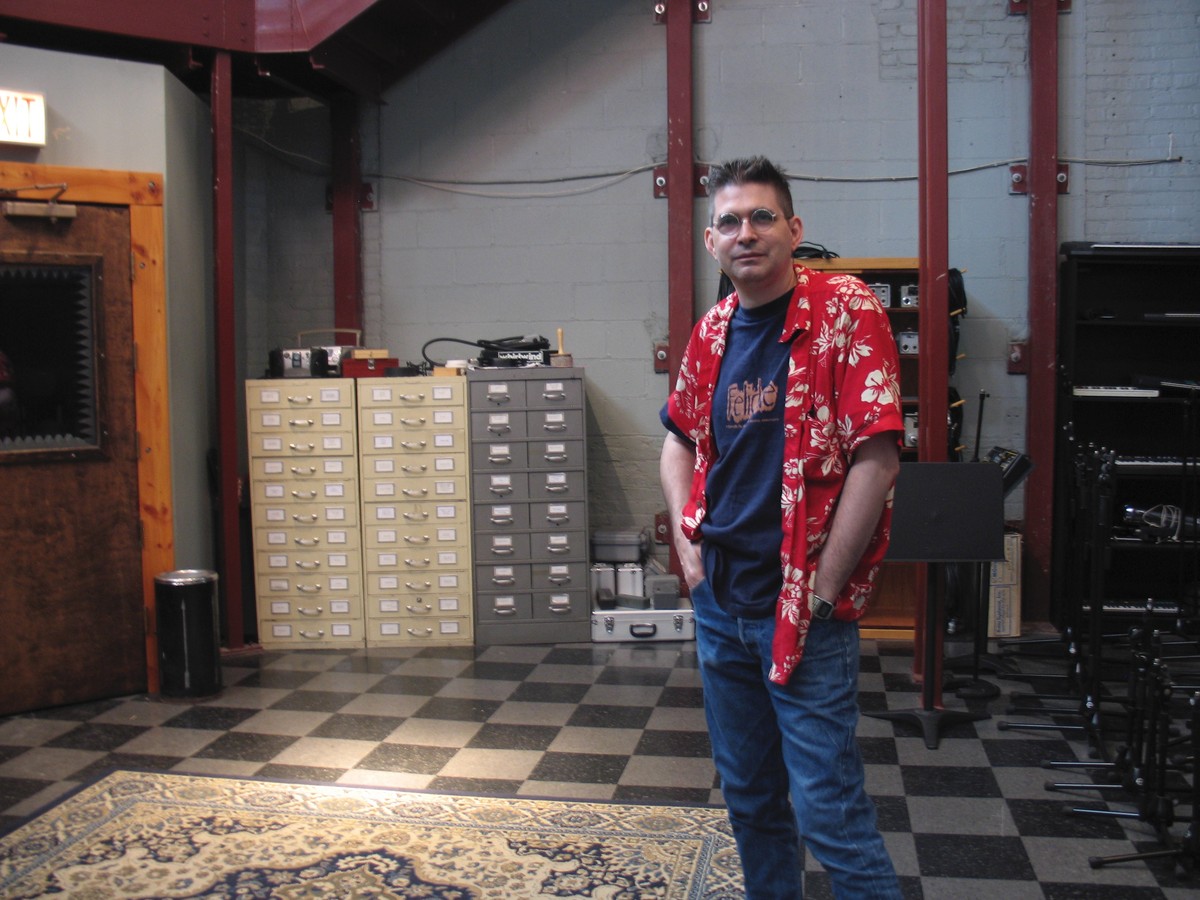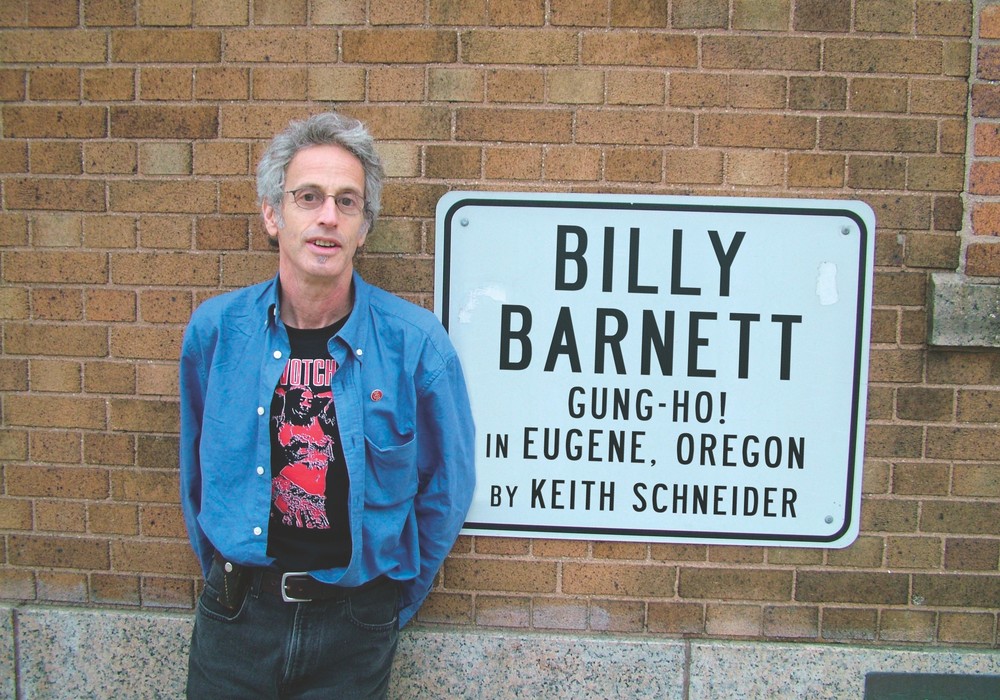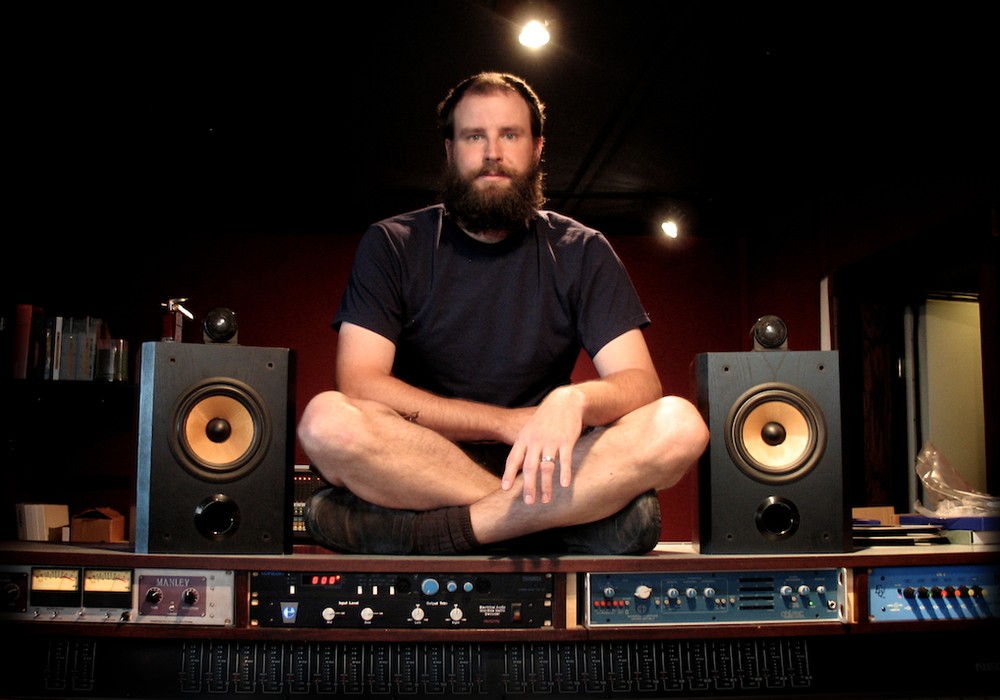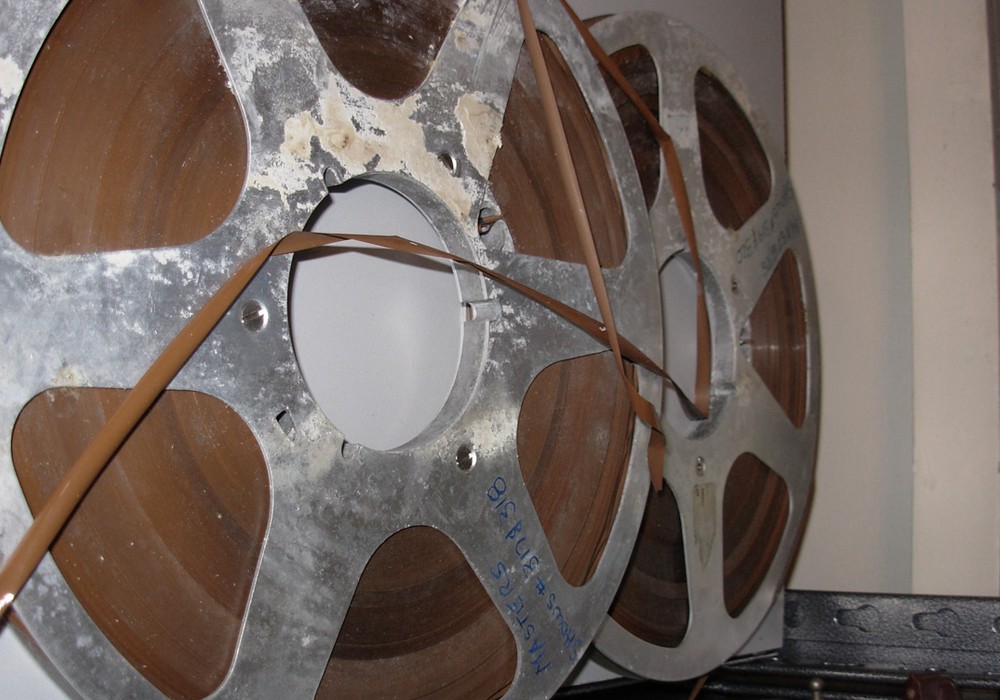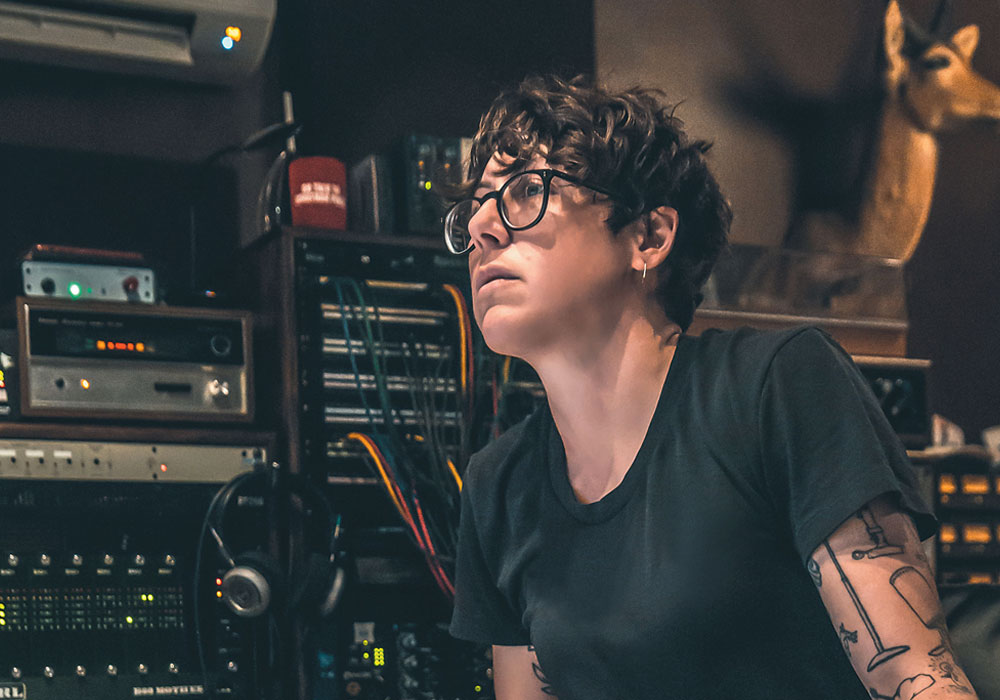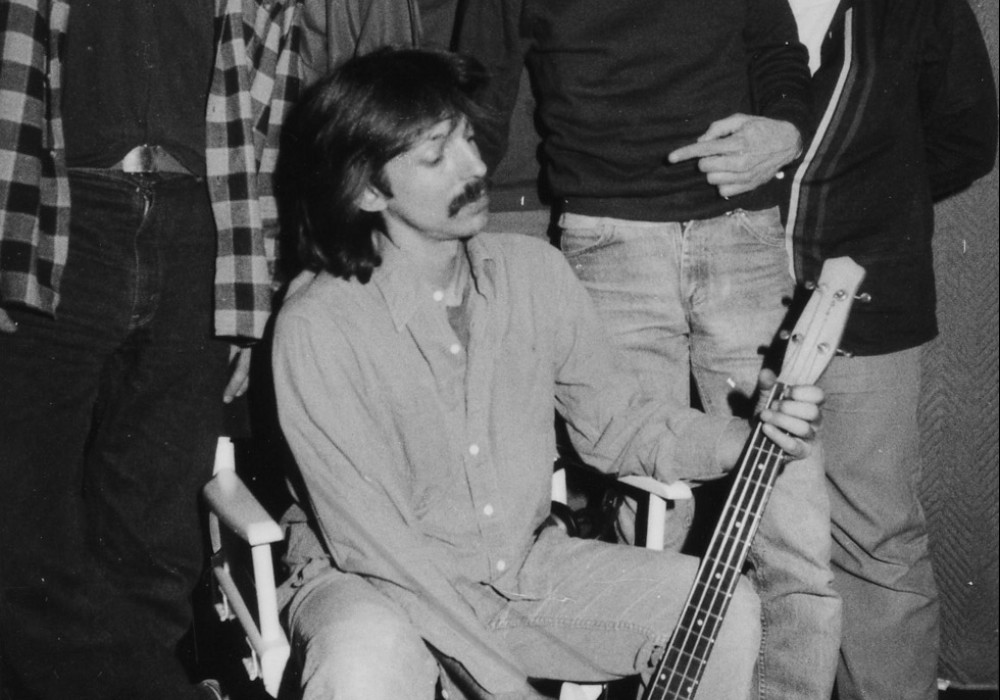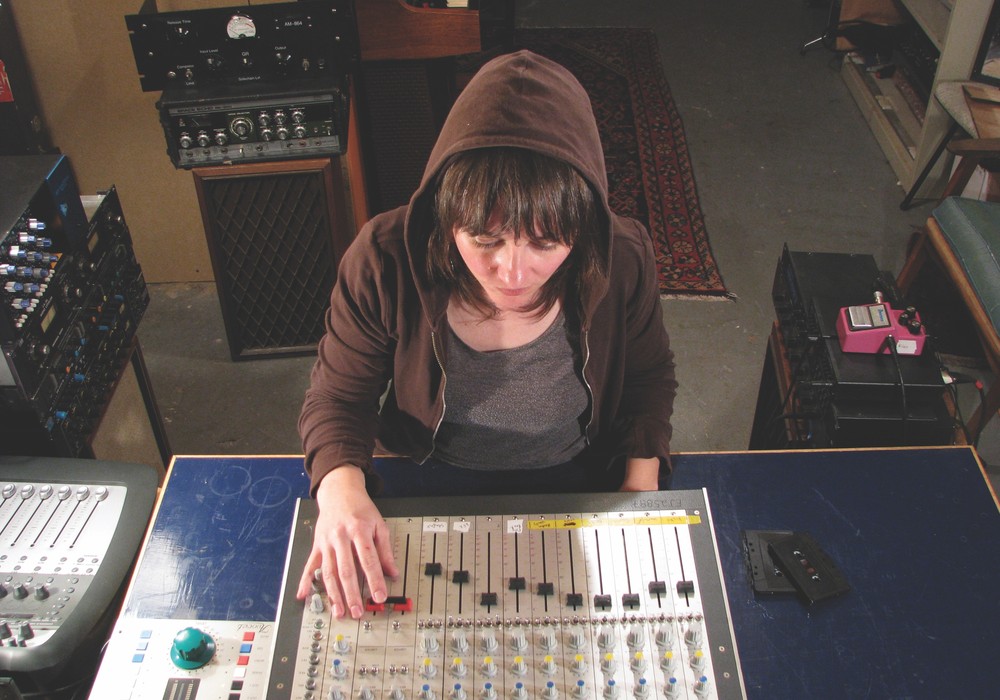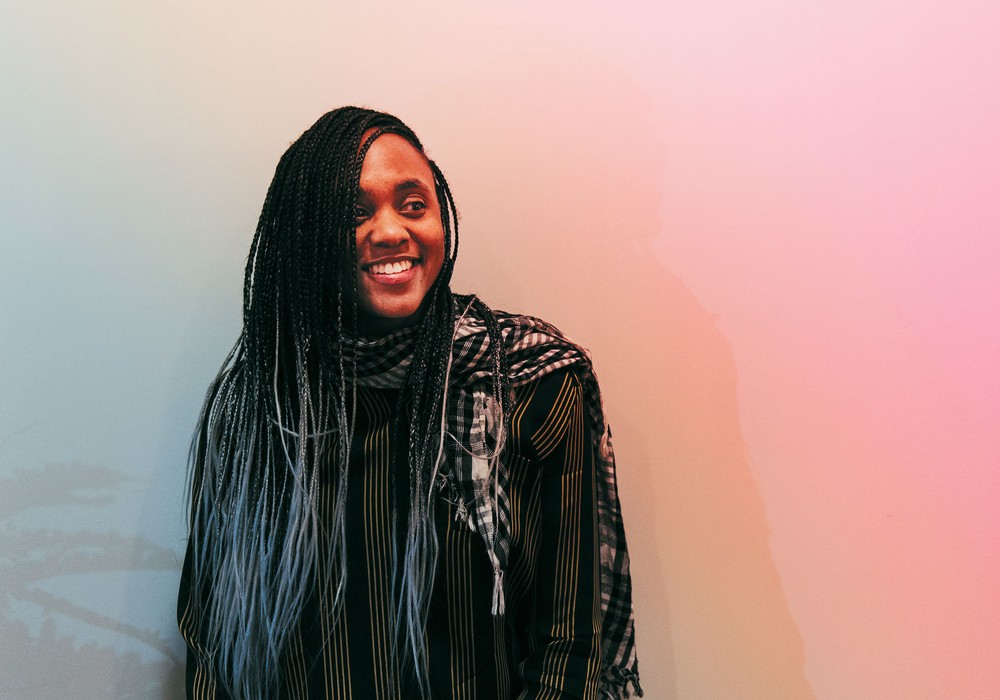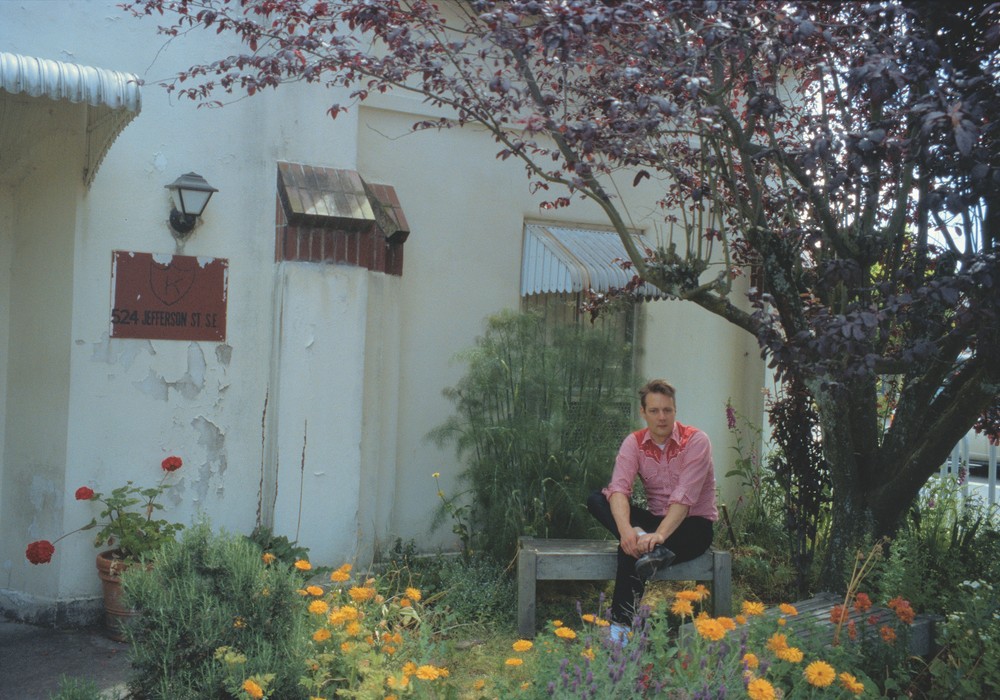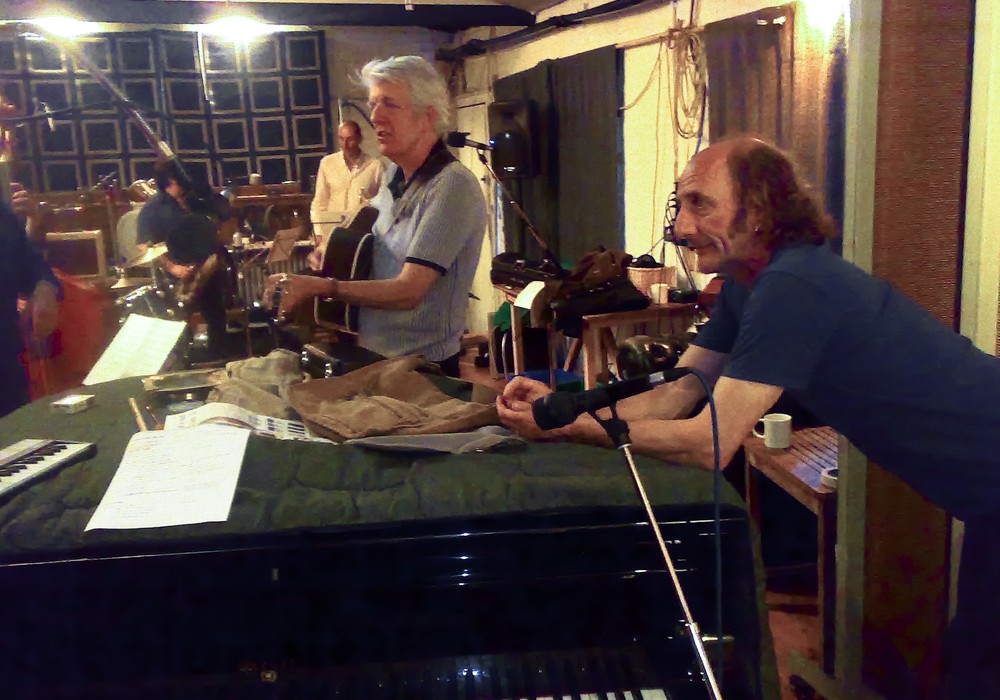He’s just a really great engineer.
Illustration by Miles Hermann
In issue #10 of Tape Op we ran an interview with Steve Albini by my pal John Chandler. Being that the piece was actually done for some oddly named company called Amazon that was branching into music sales, I spent the next 13 years telling Steve that someday he and I would sit down to do a "real" Tape Op interview — or at least one he knew was actually going to run in this magazine. Steve Albini surfaced on the music scene in the '80s with his excellently abrasive combo Big Black, and later in bands such as Rapeman and Shellac. But along the line more and more of his time was spent in the studio and eventually he built Electrical Audio, one of the finest studios in Chicago. Among the records he's had a hand in are classics by Nirvana, the Pixies, The Stooges, PJ Harvey, Slint, The Breeders and The Jesus Lizard. Many people deem Albini "controversial" and want to pick away at the "outspoken character" they imagine him to be. I've called bullshit on that for years.
How long has Electrical Audio been open?
The studio's been open for 14 years. We bought the place in '95. So we've had the building for about 16 years.
Before that, you were working out of your house?
Yeah, I had a house about a mile from here.
I assume the impetus to do something like this was because the space became available?
Well, the main thing was that Heather [Whinna, Steve's wife] couldn't take it anymore. [laughter] I don't know if you're familiar with Chicago bungalows, but basically they'll have a front room with a swinging door that goes between the bathroom and kitchen. There will be a bedroom off the kitchen and two bedrooms off from there. That whole house had been taken over by the studio. The basement was the playing area, the attic was the control room, the front bedroom was the business office and the back bedroom was the repair shop and tape storage. So, in terms of privacy, we had the bedroom that we slept in. That was it. There were people there every day. There was literally no privacy. She said she couldn't take it anymore. It was either buy a big studio or have trouble with Heather. I don't know if you've ever had trouble with Heather, but you don't want to have trouble with Heather. [laughter] I got a total steal on the building and I borrowed money to do construction. Then I borrowed a bunch more money to finish construction; at which point I sold my house. The deepest hole was very close to a million dollars. It sounds insane, but when you think about it people were spending that kind of money just on a house. Here, I've got this massive building with two studios and a bunch of employees.
You can earn money here.
Exactly.
So, let's go back. The first time I interviewed you was in '86. I saw you out in San Francisco playing with Jane's Addiction.
That was a pretty funny show. That was one of the weirdest backstage experiences ever. It was the Big Black farewell tour and we were supposed to be headlining all these places. And then, out of nowhere, I realized that our backstage had been taken over by Jello Biafra and Lydia Lunch. I actually had to leave. I couldn't bear the swirl of nattering conversation. I got hit with a little bit of Jane's Addiction, but I managed to maintain my head.
No one even knew who they were.
No one did. They didn't have any records out. I got cornered by one of them backstage and he wanted to know if I'd seen the show. I said, "Not much." And he still asked me what I thought. That should've been enough of a clue. [laughter] I came up with what I thought was probably the best answer. I don't know if it was Perry [Farrell] or someone else. I said, "I've never heard Rush, but that's exactly what I'd imagine Rush to sound like." [laughter]
That probably confused the hell out of him.
I don't think he was offended, so mission accomplished. It seemed like most of the music I liked was coming from San Francisco. I don't remember one fucking thing coming out of L.A. that I cared about. And skateboarding. What did that have to do with punk music? What's next, yo-yo tricks?
Lawn darts!
Yeah. Slinkys.
It's another version of the hacky sack at Grateful Dead shows.
Yeah. None of that shit meant anything to me.
I know your first Big Black EP was done on a 4-track cassette.
It wasn't a cassette. It was a reel-to-reel 4-track. I borrowed a [TEAC] A-3340S from a guy named Sam Fishkin, who's still an engineer and makes records in town here. I borrowed a 4-track from him and did the bulk of recording on that.
How did you first lean towards recording yourself?
If you don't have a band, but you have time on your hands, you can putter around and do stuff on your own. I'd been in a band that had recorded a 4-track demo and they'd entrusted me with the recording of it because I'd done it before. In doing that, I rekindled an interest in it. When I got kicked out of that band, I thought, "Fuck it. I'll just record my own stuff."
Was that the band that was supposed to record with Martin Hannett?
They did. It was a band called Stations. They had a weird profile in Chicago. They were on the artier end of the spectrum and they took themselves quite seriously. I think I was one tick too young to mesh with their aesthetic and I was also a little too interested in doing my own thing. I wasn't very adult, at that point. I couldn't have sublimated my desires into a band very well.
Actually, that woman from the band contacted me eight or 10 years ago to remix those tapes. They were living in Portland for a while.
 Illustration by Miles Hermann
Illustration by Miles HermannYeah, George. I think the two of them were running a vegan deli. I haven't spoken to those people in years. The last conversation we had was fairly unpleasant. I don't harbor a grudge against them at all, but apparently they harbor a pretty significant grudge against me for having dismissed their music for being new wave/skinny tie. I still think that Stations was on to something of interest.
So, being dismissed from that band lead to you renting a reel-to-reel, as well as tracking things on your own?
Yeah, basically. I'd been in a part-time band before that, but I think we played one show. I wanted to be in a band, but I didn't seem to be very good at it. I capitulated for a moment and decided to record myself. My thinking was that I would use that demo as a calling card to get people interested in playing in a band with me. It did work out that way, but in a circuitous fashion. I actually had to release a record [Big Black's Lungs] before I could get people interested in playing in a band with me.
When you did the next record, you had Jeff Pezzati [of Naked Raygun] on bass.
Yes. From the first time we played live it was Jeff, Santiago [Durango, also of Naked Raygun] and myself. And we played like that for almost two years until Dave Riley joined the band [on bass]. We played a lot. We played in town easily once a month.
And that was using the drum machine.
With the [Big Black's] Bulldozer we had a guy named Pat Byrne who, at the time, was the drummer with Urge Overkill. He was a super nice guy. He'd expressed an interest in playing with Big Black. We had one rehearsal with Pat and we went into the studio pretty unprepared. He adapted well. I enjoyed that session a lot.
Did you continue to play shows with the drum machine?
Yeah. It just seemed too cumbersome to incorporate another person. When you're in a three-piece band, one guy can get the other guys' attention. You can switch songs, change order and whatnot. It's not improvisation per se, but you've got flexibility. With more people involved there's a bucket brigade. With three, you're very nimble. I liked the format of having three people in the band and it didn't bother me to play live with a drum machine.
I think that's something people don't get. I saw you live and that drum machine was pummeling.
We tended to travel with a soundman that was our friend and knew the score. Then a big change came. There was a guy in Chicago named Steve Björklund who was in the band Strike Under. He left town for a bit and then came back and started a two-piece band with a drum machine called Breaking Circus. I don't remember how he did it, but he got a hold of an [E-mu] Drumulator. That's the machine he was going to base his band around. He let me borrow his Drumulator for a couple of Big Black recording sessions. I had to get one. As soon as I had a chance to play with his, I knew I had to get one because it was so much more flexible than the one we'd been using. It sounded better. It had individual outputs. You could have your entire working vocabulary of songs in residence. For a performing band with a drum machine, it was the ideal solution at the time. It allowed such a range. You could conduct an entire show with that, but you weren't overwhelmed by options.
So in sessions, like the session with Pat Byrne, where did you go to record and who were you working with?
That was the first session with Iain Burgess. I'd gotten introduced to Iain very shortly after the first Big Black record had come out. Jeff Pezzati introduced me. Naked Raygun had just started working on Throb Throb with Iain and they were really stoked about him. At the time, he was the best friend of every band in Chicago. He was a real champion. He worked at a studio called Hedden West, which was a small suburban studio that had a second business doing cassette duplications for lectures and churches. It was a very small, very dead environment. Just getting introduced to Iain was worth the effort. He took me under his wing and showed me a bunch of stuff around the studio. He eventually got hired by Alan Kubicka who owned Chicago Recording Company. Iain proposed to him that bands make their records there over the weekend — he swung a deal for a fixed rate. As soon as he did that, he basically cornered the market. Everyone did a record with him in that period.
And that was a well-equipped studio.
It was a great studio. At one point they had three buildings. Most of them were used for voice-overs, but a lot of them were full-featured recording studios. They had a beautiful Neve console in one of them. They had a beautiful Cadac [console] that sounded pretty good. They had a Flickinger that was eventually taken out and installed in Iain's studio [Black Box] in France. All the Big Black stuff was done on the Neve or the Cadac.
What kind of things were you learning about recording from Iain?
The technical side is grunt work. You have to learn how signal flow works. You have to learn how to maintain your machines. You have to learn how to calibrate your equipment. You can't pick that up — you have to learn it. I self taught and then Iain showed me what I was doing wrong. [laughter] Iain maintained an attitude that whatever a band was doing, there was a reason for it. He would indulge it, provided he could understand that reason. He had a very open mind, from a procedural standpoint. That was a very big influence on me. The other thing was that his aesthetic as a rock fan was in tune with mine. He liked stuff that was powerful. He didn't necessarily like stuff that was pretty. A lot of engineers at the time were into to things that were classy and slick, like Steely Dan. Records that had been slaved over meticulously. Iain liked records like Thin Lizzy and Cheap Trick — things that had a mania about them. It didn't fit an aesthetic archetype. He also loved the nerdy prog- rock. His favorite band was Guru Guru — a jammy psychedelic band.
I assume those records with Iain were more co-produced with the band. Would you call it that?
I would call it that. At the time, the band wanted to claim more authorship of what we were doing. But Iain was more in charge than we were, absolutely. In the early sessions I wouldn't have known what button to push. There was a "eureka" moment when we were working on Headache, which was the first record we did with Touch and Go. Corey Rusk [Touch and Go's owner] had a deal with a studio in Detroit called Multi-Track Studios, where he had done Die Kreuzen, Negative Approach and whatnot. We were all huge fans of the [self-titled] Die Kreuzen album; it was just blistering.
I couldn't believe it when I heard that!
I don't want to sell that band short, but Die Kreuzen was a perfect encapsulation of that sound. We wanted to have Corey do a session. We did part with Corey and part with Iain. Iain was going through a breakup and he was drinking a lot. He was going through a period of not being very responsible. We wrote him off at that point and kind of carried on on our own. We decided we were going to do our records ourselves, after Headache.
You worked with John Loder, didn't you? On Songs About Fucking?
Yeah, Songs About Fucking. He was another one. At that point, Touch and Go did their distribution through Southern, which was John Loder's thing. All of us were fans of the records John had recorded: the roughness of Crass and the Small Wonder label's singles. He'd done those Bauhaus singles — those singles sound amazing. But we did the remainder of recording on our own after working with him.
Where did you record the remainder of those tracks?
We built a studio that became the studio in my house. I'd bought a house in the spring of '86. We'd talked to Corey about having done half the album with John and wondered how much Touch and Go could front for the other half. We figured we could build a studio in my house with the money. We bought an Otari MX 5050 8- track and a 5050 2-track. We also bought a Soundcraft 200B 16-channel mixer. It was enough. It was fine.
I feel like that record sounded different compared to Atomizer, which had a shimmery, bright sound.
Oh, yeah. If you compare the stuff that we did on the 8- track in the basement versus the stuff with John Loder or Iain, it's obviously much cruder and simpler. It's less creative and much more thuggish. [laughter] But it allowed us to finish the record. It got us started on the path.
So, all these things started happening in your house.
Yes. Once we shifted gears, things started happening. I was making records every weekend and most evenings.
And weren't you also doing graphic design at the time?
I was working doing photo retouching. I was working with a company called Color Image. They would do big display transparencies, like for airports and casinos. We also did the high-end, expensive cigarette ads.
I know you've got a journalism degree. How did you end up working in photo retouching?
My minor at Northwestern was in painting. I was always interested in design and graphic arts. I was also interested in photography. I basically answered an ad. I was familiar with tenets of the job. I basically bullshitted my way in. That was my habit at the time — do whatever it took to get the job and figure it out later.
I'll bet a lot of engineers have the same story! "Can you run this session tomorrow?"
"Sure. Why not?" I know this is true with recording, but I think it goes for most things: pretty much everybody is faking it. Pretty much everybody is not as good as you think they are at it. Everyone is constantly afraid that they're going to be found out as a fraud. Now I've been making records long enough that nothing really surprises me. I don't feel like I'm going to be baffled. I might not necessarily get it right the first time, but I'll have an approach. I'll have a way of getting through the problem. It wasn't that way when I first started, but I was lucky enough to work with peers who would deal with just about anything.
What I find interesting is this sense of community. You've mentioned musicians entrusting you with work and being a part of something.
Yes, any decent music scene is like that. There will be a network of people that all know each other and help each other. There will be little fraternity of bands that do things together like playing shows, sharing a practice space, swapping girlfriends. The only thing that sucks about New York is that bands see themselves as in competition with one another. Every now and again there's an interesting band that makes it through the gauntlet. But for the most part, it's very competitive; whereas Chicago or other Midwest cities, an awful lot of bands worked arm in arm together. They weren't necessarily all close friends, but everyone was working on the same project; that project being having an awesome music scene. They were comrades, if you will.
There always seems to be a studio, or studios, that are involved in that same nexus.
Whenever there's a group that gets together like that, there's often a place that ends up being where people gather. There's also almost always a guitar shop where everyone meets to get gear fixed. You only need one of each. That cements the community.
Do you see Electrical as a continuation of that?
Well, by the time Electrical opened, there were many [others] doing the same thing. Things had diversified and enough money had come into the scene. I don't think the sense of identity with a place was as strong. By the '90s there were profiteers trying to come in and make a living off the scene that weren't personally involved in the scene. That wasn't the case in the '80s. You were either part of it, or you weren't. We've always been in it — we see ourselves as a part of that cooperative and collaborative continuum. But there are elements of competition that entered into it in the '90s that were never there before. For example, Butch Vig had a place in Madison, Wisconsin called Smart Studios [Tape Op #11]. Touch and Go had a lot of bands that liked to record at Smart. By the same token, I also did a lot of bands that recorded on Touch and Go. I never felt a competition with Butch. I felt we were both on the same team. There was some friendly competition for specific gigs, but that's just a weaker element of my personality expressing itself. [laughter] I had nothing but respect for Vig. I have seen a change in the social personality of the scene. We don't feel in competition, but it feels like people think we are. I'm trying to make this a resource. My number one goal in building this studio was not just for myself; I wanted to offer it as a resource to the community in Chicago so that bands wouldn't have to work in a crappy studio. The goal was to make this so great and so cheap that you'd have to be an idiot to work elsewhere. That wasn't a selfish consideration. It was more of a, "Wouldn't it be great if we had something set up in Chicago that was such a great work environment that no one would have to suffer?" Everyone would always have a good time, make a great record and come in under budget. That's always been the desire.
You certainly know how hard it is to make money running a recording studio.
Yeah, it's impossible. As a business model right now, running a recording studio is almost guaranteed to be a losing proposition unless you have a very specific set of circumstances that are in confluence to make your life easier. Like, if you are in a town that has a great music scene but by sheer accident doesn't have a recording facility... right? Then you can probably make a living. If you've been bequeathed a building and some real estate, you might have a chance. If you're starting from scratch, forget it. Those days are over.
At the point that you had a lot of activity at your house but you were also making excursions to other studios, did you consider becoming the guy that has a small setup at home, but also spends time in other studios?
Well, the inefficiency of that really bothered me. I did consider it, but didn't like how it looked financially. It seemed like a mistake to take business to another studio and only get a tiny fraction of the money. It made sense to keep things at my studio and reinvest the money into the musical community.
In many ways, you are doing that here.
Yeah. The difference being the change in recording technology, the sessions are cheaper now than they were before. In 1979, you could buy a car for $5,000 but a studio session would cost you $2,000. Now, you're going to spend $30,000 on a shitty car and studio time is going to cost you $800. Things haven't gotten cheaper outside the recording studio, only inside the recording studio.
At the same time, the price of tape decks and some consoles have dropped.
Yes, but if you were to get a new Neotek Elite it's still going to be $100,000. If you find a cheap desk, it's probably because it's busted and you can't make a record on it.
Microphones are something I want to talk to you about. You've amassed a decent collection. How did you build the knowledge of different mics? Did you sit and check them all out?
Yes. When I went to a studio, if there was a mic I was unfamiliar with I would stick it up somewhere just to listen to what it sounded like. There's also a lot of local lore in studios. Like, "That mic is great for snares. You wouldn't know it by looking at it, but it is." So, is it? Let's find out. I like the sound quality of a lot of the Peel sessions [for John Peel's BBC radio show]. They were always rough and ready — they set up and played like they would on stage. One commonality was that they used a lot of those STC microphones on the guitar amps, and I always thought the guitars sounded great. So I went on sort of a snipe hunt to try to find STC microphones.
Which was hard, years ago.
Yeah. So, I found a few and they were great. I ended up latching on to that. The way it works is you find something you like, you latch on to it and it becomes a part of your arsenal. As you build your vocabulary as a recording engineer, gradually more and more things make sense. It's like when you're cooking — you have a sense memory of a certain taste or style. You'll find a recipe that has what you're looking for and learn that. It's basically the same thing. You have a sense memory of something and remember something working well from a previous session. So when you find an analog to that situation, you have a means of at least starting to experiment.
I was going to ask you about cooking relating to recording — and here it is!*
I don't think it relates that much...
No, but I think the analogy works via the improvising with X amount of elements and putting it together in a pleasing way fits.
Yeah, but most of the time in the studio, I'm not responsible for that end of it. I'm just responsible for the problem solving. You don't necessarily know what's coming — but when you listen to things, you'll at least have a target to shoot at. I'll see a microphone in a listing and it'll be cheap enough that I can buy it to see if I like it. Like the Sony C17, it's a small diaphragm plastic tube condenser mic. Haven't yet found anything that it sounds awesome on. I've had it for 10 years now. But it sounds okay on a number of things and I may eventually stumble across something it sounds awesome on. But, until then, I'm not getting rid of it. I'm hanging on.
Have you ever had a mic that you purchased, tried out and decided to not even have available to use?
We've gotten rid of a bunch of stuff. There's a ribbon microphone called a Reslo. For a while they were marketed as being associated with The Beatles because there are some photos of The Beatles playing in a club where you can see the Reslo mic in the frame. We actually got a hold of ours long before that. They have a bunch of internal connections that allow you to change the impedance of it by using different taps on the output transformer. We had to go through all the iterations before realizing that it was kind of a shitty microphone. It doesn't sound that good. It's kind of murky with low signal quality. It was a dull microphone, so we sold it. I try not to hang on to stuff that doesn't get used, because then it's just money sitting in a drawer somewhere.
One thing we haven't touched on is outside jobs. What was the first time you got called to an outside studio?
Well, the first session I did with a band I'd never met was the Pixies' Surfer Rosa album. Every other job I'd gotten up 'til then was because I'd been introduced to someone as a friend of a friend. Everything had always been a friend or an acquaintance. Then I got that Pixies session and I thought, "Oh, wow. I guess I can do this for people other than my friends."
And this also involved flying out to Boston?
Yes. That was about '86.
How did that come about? Had they found your name on other records?
At the time, they had a very strong-willed manager who'd convinced them they should do whatever their English record label said. The English record label was 4AD, run by a guy named Ivo Watts- Russell. Ivo was familiar with Big Black. He was fond of the Pixies, but he thought it would be a good idea to have them work with me because, at the time, I had a little bit of cache with the British press. Also I think he probably thought their aesthetic and my aesthetic were not miles apart. Ivo put it all together. I kind of feel guilty. During the making of that album, I was "guinea pigging" them a little bit, if I may invent a verb. There was stuff I wanted to try that I hadn't had a venue to try out yet, so I made them the guinea pigs. On the Slint record [Tweez], they didn't want to have any gaps. I don't remember if this record was before or after the Pixies. But Slint didn't want any gaps; they wanted all their songs tied together with song effects, conversation or ambient noises. So, I kind of imposed that on the Pixies as well. I feel a little bit self-conscious about that now, because I know it's not something they would've come up with. I feel like I externally added that to their band and now they have to answer for it. All that little chitchat shit — they aren't really chatty people. Now it strikes me as slightly false and they have to live up to it. They've had people ask them about that in several interviews and I feel like I'm at fault.
One of my favorite things on that record is Kim's backing vocals on "Where Is My Mind?" — the beginning with the reverb and the vocal. Was that something you stumbled on, mix-wise?
Yeah. They had a [Lexicon] PCM 70 and there's a setting on the PCM 70 called "infinite reverb." I played around with that for a while and I liked the idea of having Kim's "Ooo, ooo" carry on when the song ended. That would be the bridge between that song and the next. I bought a PCM 70 because of that session, now that I think about it. Not for the infinite reverb, though. There was a multi-tap reverb I liked. The stereo echo had a way that you could pull up additional voices, additional delays — and you could have as many as six individual discrete delays. They could all be panned left and right. I still use shit like that today. I use a splatter of quick delays with no regeneration to simulate ambience on something that's recorded dry. I use that a lot.
Like a diffused reverb?
Yeah, but no regenerative effect or ringing quality. I use that a lot.
What other jobs came from that? You ended up doing the Jimmy Page/Robert Plant record [Walking Into Clarksdale].
Yes. Very few of the sessions I've done have bummed me out in any way. Umm. There were a few minor disappointments, but basically it seems like I've gotten along with pretty much everyone I've done a record with and the results were at least okay. I don't have that many complaints.
You've got a public persona of speaking your mind.
Okay. Your story checks out. [laughter]
I think there are some strange perceptions about you.
For years the record business was an offshoot of old school show business. The people doing the talking, hyping and promoting weren't involved in the music. They were external to it and they lived in the mythology of it. So, there was a very strong incentive to create and extend mythology, like having people with outsized personas and insane back-stories. Even when that stuff lost its cachet within the music community, there were still people in the old guard who thought that's the way music should be presented. It still happens. There's this radio program, Sound Opinions, with two working music journalists [Jim DeRogatis and Greg Kot]. They're not idiots, but they talk about musicians as if they're space aliens. Like what they do are not normal, everyday things. That kind of thing bothers me. I'm prone to it. I have an impression of Jack White, whom I've never met. I know, by reputation, before he got famous, that he was very helpful within the garage rock community. He helped a lot of people and a lot of bands. He put shows on. He helped record bands. He's a totally solid dude. The public persona that's been developed since then? Totally different. I know for a fact that my impression of him has been influenced by the public persona that people working with him created. He's not responsible for all the bullshit flying in the window, but that's the stuff that makes me think he's weird.
He's actually very nice.
I believe you, 100%. I'll bet he's great. There are people that have these wild public images. Every now and again you stumble across one in a social situation and it turns out they're totally normal.
Like Alice Cooper.
Yeah. And Iggy Pop. Being on the phone with Iggy Pop and talking about a Stooges session was exactly the same as being on the phone with Tim Midgett and talking about a Bottomless Pit session. Yes, when he's in the studio he's a big, bold personality; but he's not a lunatic.
He's got a job to do.
Exactly. I kind of don't give a shit what people think about me. On one level, that's part of their experience. They get to form these opinions of other people and harbor these fantastic notions about them. Like, we've all heard about Rod Stewart having his stomach pumped. That's part of my experience with music — these fantastic stories. I don't want to disabuse anyone of a notion about me that might be giving them some quiet pleasure — like thinking that I'm an asshole or that I'm bitter and stewing in a room alone. That's probably satisfying to someone, to think that; and I don't want to take that away. You're welcome to it.
Part of the reason I think there's that perception is that you've been fairly outspoken. You'll discuss subjects like "producing" or not producing a record.
Yes. Or the generally abusive relationship between a band and its record label. In a lot of cases, that's just a reflection of my exposure to it. If I have an opinion about something, there's a chance that it's ignorant. But if I have direct experience with something, then I tend to be a lot more convinced of what I'm saying. There's a lot of fantasy in the music industry. But, a lot of the time, the fantasies are made up by people not at all involved in the music scene. I don't feel like I have to apologize for having an opinion that's formed from a direct experience of mine. People who live in the fantasy realm of received wisdom say that I'm cantankerous and outspoken about the industry. I'd wager the majority of people that say that about me probably couldn't name, with any certainty, a single opinion I hold. I'll state a position I do hold: the lion's share of the reward for making an awesome record ought to go to the band that made it. That seems like a perfectly reasonable position to hold. If you asked a journalist, my suspicion is that they would cite it as an oppositional position, "Well, he's against the major labels," instead of saying, "He's for the bands." People who deliver their art to the world should reap the benefits. There are a lot of secondary conversations we could have, but it seems pretty obvious to me.
One of the thoughts I've had about studios is that we're in the service industry...
Oh, absolutely.
...and there's a myth people create about the studio and the people who work in them. Like, "Oh, you're going to work with Steve!" As if you can imbue a product with a thing.
Yes, as if I'm The Wizard of Oz.
You and I both know that when people walk in the door with great ideas, that's when the great records are made.
Right. The record is going to be as good as it is when they bring it in the front door. If a band comes in with awesome material, well rehearsed and they don't take no for an answer, they're going to have a great record. If they come in with ideas they haven't experienced, if they're listening to someone else or are being socially engineered, you're almost guaranteed not to have a good session.
What do you see when you have a session that's a bit more open-ended? Say it's based around a songwriter and different musicians are coming in and out.
That can be quite free form. As far as who's playing and what's happening on that end? That's all sorted before someone walks in the door. That must be worked out beforehand.
Have people asked you to do sessions while asking for help on who can play drums, for example?
We can help people like that out, but that's all before things start. Once the door is closed and the red light is on, we should be making progress. We can help with introductions — we can give you time to practice. But that should be done beforehand. I find that, generally speaking, the more familiar someone is with the studio, the more prepared they are when they come in. If someone is new to the situation, and unfamiliar with the cost, they might be more indulgent.
Speaking of finances, there's this weird myth that you have a sliding scale. You can go to Electrical's website and your rate is right there!
Right. I'll admit, when I first started out, I didn't know what I was worth and there were different rates. But people want to know how much it's going to cost and we feel obliged to tell them. I don't deal with the billing. For dear friends that I've worked with for a long time and done a lot of records with, I might work for free. If someone's had a hardship at another studio, I might help them out. It's all relative. I don't have any qualms about throwing things in as a professional courtesy. I believe in goodwill. Normal, civilized stuff. The only sliding scale I have is if I get approached by a big record label and I know I'm going to have to deal with the big record label to get the money, I tend not to go by the book rate for my services. The studio stays the same. Everyone pays the same rate for that. But it might be different for my time and energy. I'll tell them to make me an offer; and they always make me an offer that makes it worth my time. I've never had to haggle. Apparently the money I need is less than what they're willing to pay me.
One of the more well-known records was obviously Nirvana's In Utero. What's your take on the remix situation that happened on that?
Everything about that record got blown out of proportion. That band went in the studio with me to make a record on their own nickel. The record company wasn't involved. That obviously made the record company nervous. They heard the results. The results had an abrasive element that bothered them. So they waged a publicity campaign to try to shame the band into doing the record again. It was pretty creepy and weird. It sounds like I'm saying something that's a paranoid raving. I was getting phone calls from journalists who said, "I just got off the phone with Gary Gersh [A&R for DGC Records]. He said you ruined the Nirvana record and they can't release it." Shit like that. That was the level of rhetoric they were using.
That's defamation of character.
Well, I don't care about that. What I care about is that the record label didn't have the balls to tell the band, "You can't put your record out because we decided that we don't like it." What they chose to do instead was use creepy psychological means to back the band into a corner so that the band would ask to do it again. It was really grotesque. I have no respect for any of the record people involved that did that. The way it all panned out, I survived. I've done okay. I feel terrible for what the band had to go through. To have the situation with their record label aired so publically... I thought that was really embarrassing. And it was at a time when Kurt [Cobain] was really vulnerable. He went back on dope and ended up dead. Everything about that was ugly. I don't see any way that I could've gotten out of it. I was chosen as the scapegoat by the record label. The band was obviously concerned. They didn't want to cause a fracas; they didn't want to get in a fight with their record label. They actually had some reservations about the record. Everyone has reservations about their record when they finish. I don't want to belittle it. What it boils down to is the record in the store — if you go to the store and buy a copy of that In Utero album — that's the record the band wanted you to hear. Kurt spent a couple of days with Bob Ludwig mastering that record. He had a bunch of little adjustments he wanted to make. Bob Ludwig made all those little adjustments. In the end, he was content with it. I'm totally content with that. I feel like I held up my end. I did a good job with them. We got the record done quickly; everyone was happy with it when we left. Shit changed after we left and I'm okay with that. I don't have any qualms. Kurt asked me if I'd be willing to remix some of the stuff. This was after all the back and forth with the record label and he came clean to me about the way the record label eventually confronted him. He said, "Well, yeah. We do kind of want to remix a couple of songs." I said, "Okay. What do you want to do?" He said, "Well, if we had time, I would remix everything." That, to me, sounded like kind of a frustrated and desperate position. It didn't sound like a considered position. It just sounded like he was throwing his hands up in the air. So I said, "I'll tell you what. I'll listen to it again and if I feel like I can do better on anything, I'll be willing to give it another shot. Otherwise, you have my blessings to do whatever you want." So I had a 1/2-inch copy of the master and I listened to it. I felt like we had wrung the sponge on all of those songs. I really didn't feel like I could do a better job. Little, tiny adjustments in the levels? Sure, you could make those tiny adjustments; but then you're rolling the dice on the other 23 channels. I felt like we got a really good result and I basically didn't want to get involved in a clusterfuck or a spiral of recriminations and remixes. You know: the version from 2a with the coda from 3b with the vocal up a half a dB and the alternate acoustic intro from take 9. I didn't want to get into a fuck show like that — and I had a suspicion it was gonna be a fuck show. I knew as soon as they ceded any control of the process to the record label that the record label was just gonna dive in. I saw the writing on the wall, "Okay, this is gonna get weird." I bowed out at that point. They did remix a couple of songs. They added a vocal harmony to one. I think they changed the string arrangement on another one. I have no qualms with that; it's their record and they can do whatever they want. And, in the end, the record in the store is the record Kurt wanted everyone to hear. I'm totally, 100% comfortable with that.
It goes back to the service industry aspect. You do your job, and you do the best you can.
It's a little bit of a shame that we weren't able to march out of that studio after 12 days with the finished, final version of the record under our arms and say, "Fuck all y'all. We did it." It's a slight disappointment that that isn't the way it came about. But 99% of the session was conducted under that basis and I'm totally happy with the job I did. I felt like my relationship with them survived all the bullshit that was going on around it. I didn't think that grown adults would behave the way the people at Geffen behaved, though. That actually was a bit baffling to me. That people who were potty trained would behave like that; it really surprised me. Like I said, the only satisfaction I get out of it at this point is that they're all insurance salesmen or something now and I still make records every day. I've never worked within a big record company. I've never worked closely with one and I've never been friends with any of those people. I don't know how all that shit works. It's still a mystery to me. That end of the industry is now disappearing to the extent that we won't ever have to worry about shit like that again. I think that's great.
Back then there was such a rush for the major labels to get in on the kind of music you and I have always been involved in.
Yeah. In the '90s there was this bizarre lust for small bands on the part of the big record labels. It was almost like they didn't really give a shit who it was, as long as nobody had ever heard of them in the mainstream. As long as they were hometown heroes somewhere, that was good enough. An awful lot of bands got snatched up out of nowhere and run through that wringer. Bands would get signed and then their record would never come out. Three years later, they're still under contract and they still can't do anything.
It just seemed to kill things. Look at a band like Scrawl.
It did stump their momentum. They were an awesome band and they still inched along, doing their own thing. Every now and again they still do a show, which I think is awesome.
One thing we haven't touched on was the perpetual hot topic for you at our past TapeOpCons. I'm referring to your stance on "I don't produce." I'm not sure if I even want to have you reiterate the same goddamn thing.
Well, what it boils down to — for the same reason I feel a band should be the recipient of the lion's share of the proceeds of their record — I feel like the band should be differed to in any creative decision in the studio. The band should be responsible for making their record to as much of a degree is possible in every circumstance. Like, if the band has an idea of how they want their record to sound, that's how it should sound. If the band walks in the studio with a completely formed aesthetic, which is a function of the people playing, that is a component of the identity of the band. It is not my business to start deconstructing that identity as my first order of business. The very first thing I do with a band should not be to disassemble them and make them not themselves anymore. The first thing I should do is try to come to grips with is try to figure out how to make a record with them from that. I know it's an impulse, on the part of a lot of producers and engineers, to start breaking down bands and fit them into their paradigm and methodology. My resistance to that comes from the time I was in a band in the early '80s. Part of the culture of that time was to make music polite and pretty. I know that did a disservice to my friends' bands that were coming in with these ugly, harsh punk groups. I knew that attitude, the predisposition of the engineer, was doing them a disservice. So, I tried to avoid that. It's inevitable that I'll have my own mannerisms and prejudices. But, as much as possible, I try to make the record be a reflection of the band. That just seems like a normal, respectful thing to me. It doesn't seem like it should be controversial. I think people who do what I do want to somehow justify their position. They want to feel responsible for the greatness of the record. They want to feel like they can claim authorship, perhaps not of the album as a whole, but certain elements. While I understand that psychologically, you need to fucking swallow that. You need to be a grownup and swallow your pride. You need to make the record that walked in the front door. Don't try to turn everything into fucking Sgt. Pepper...
If someone doesn't want to work the way you work their choice can be not to come to you.
Yes. I also feel like when you're in a position where someone is trusting you with their life's work, their creative outlook, and spending hard-earned money, there's a responsibility there that people in the recording industry duck. They duck that responsibility by saying, "It's all good. You can do whatever you want." I don't believe it's "all good." Some elements are destructive to the band. I don't think everyone needs to think like I do. I do think if it's your job to work with self-contained bands, then you won't make a mistake if you err on the side of not fucking with the band too much.
There are a lot of paths you can go down to make an album.
Yes, and the less serious the endeavor, the more you should open up to the process. If you're not being paid, that's a big one for me. If someone's paying me, I've got a professional responsibility.
A friend of mine said he thought some of your best recordings were of Whitehouse or Labradford — music that doesn't have such a typical stylistic center to adhere to.
I enjoy working on lots of different kinds of music. I'm not equally in love with it, from a fan stance. But, as a recording engineer, you get a rewarding experience by solving problems. The time to fuck around is when I'm playing with my own band. We're adults, it's our music and we can handle it.
Do you find with Shellac that you and Bob [Weston, Tape Op #18] get to play around with ideas and try wacky things in the studio?
No; although I did learn something from Bob. He said something in an interview 20 years ago that I thought was really smart. He said in every session that he does, he tries to do something that he's never done before. I thought that was really smart, so I immediately adopted that and I do that as well. I try to at least set up one microphone I've never used before. Just something so that I'm broadening my vocabulary, one syllable at a time.
Without taking a risk on the whole thing...
Yes, without making someone responsible for my failure. Over the years, that's been a very productive thing. If you create a circumstance where you have to learn something, you will.
You've had the opportunity to record people you might classify as your heroes over the years. The Stooges, Cheap Trick... I know you gushed a bit about The Stooges.
Fucking awesome! I kind of feel like it's almost unfair for me to have my wildest dreams fulfilled in that way. Very few people get to be astronauts or become President. But I got to spend a month hanging with The Stooges. It was fucking awesome! And the Cheap Trick thing. We've actually developed a strong relationship that's survived for a long period of time. I don't do that much actual recording for them. But we do a lot of stuff with their archive. They're gradually acquiring their masters, piecemeal, over time. They're putting a lot of videos up on their YouTube channel. I don't know if you've ever looked at their YouTube channel?
No!
You could blow an afternoon on that, easily. Bootleg concerts and whatnot. A lot of their source material is from TV shows that they did. Seeing them and seeing the restored material is super fucking great. So, we've been involved in a lot of stuff for Cheap Trick, like documenting and cataloging their archive as well as creating working copies of stuff. A fairly big project for them was rerecording the entire In Color album. At the time, that struck me as a mistake; like a capitulation of "we did our best stuff a long time ago." It seemed like a mistake, up until they started working on it. Then it seemed like the best idea ever. It was so invigorating and it was so much fun. It was so satisfying to hear them blowing those songs out full- bore.
I would imagine!
So far they haven't released it. I think it was more about them exorcising their demons about that record. I think they felt for years like they'd been carrying that record around and that record didn't represent them. They just wanted a shot to do it their way. And, once they did, I think it soothed their ennui. I don't think they feel the need to exploit that; it's just something they wanted to do.
Working with analog tape has certain restrictions. Do you perceive some of your working methods as being restrictive in order to rein things in?
Because it's the way I learned to make records, I don't see them as limitations. I actually see a limitless range of possibilities. I can see, from a technical standpoint, that there are limitations. I've never run into a circumstance where I feel that I've made a weaker record because of limitations or techniques I was using. I find it hard to credit the equipment, or the generation of technology, with my ability to make decisions. I've learned how to make records in this way, so it's never occurred to me that I needed more. I guess if I'd ever felt confined, I'd be more cautious of limitations; but I've never felt that way. I've always felt like, "Man, if you can't make a record with 24-tracks, you're not even trying." Seriously. You need more than 24 things going on during your record? It's kind of hard for me to imagine.
On Superchunk's No Pocky for Kitty, I don't believe you're credited for recording.
Probably not. They asked how I'd like to be credited. My general preference is not to be listed and they were one of the few people that said, "Sure." I've never really followed up on it. If a band lists my name on their record, that's another thing that they're going to have to answer for. Someone's going to ask them to justify that decision. So, my general preference is not to be listed. It's not really important to me and it might cause some trouble for them. I have done a lot of records where it didn't get mentioned.
I really like your pro-artist stance. I think that's important to a lot of us who were playing music in the '80s.
Man, the '80s were ugly, weren't they?
There was great music, but...
In our realm, there was great music. In the world of the great unwashed? There was a sea of [Yamaha] DX7 [synthesizers], LinnDrum and [Tom Scholz's] RockMan. What some people are nostalgic for from the '80s are all the things that made me want to pull my fucking hair out. [laughter]
You've been outspoken against digital recording.
I think it's great for certain things, certain things that don't matter. I have no patience when there's a Pro Tools element in the studio. We had to do a session the other day where we did a multitrack session recording this band. One of the guys couldn't get into the country, so we had to make some tracks in Pro Tools, send it back to Norway, do his overdubs and then send it back here. That whole way of doing things is a real pain in the ass. At the end of it we had to transfer a studio master because the mastering lab couldn't deal with 1/2-inch tape. For a start, what kind of business do you have being a mastering lab if you can't deal with all mastering formats? That's one thing. As an aside from that, just making a copy of these two tracks into the Pro Tools session took forever. It was really torturous to set up. It exhausted me and I fucking hated every second of it.
Obviously a tool is a tool and you can use it any way you want. It's your choice to keep working on tape.
Yeah, I think there's more to it than that. I don't think you can unilaterally say anything like that. The digital systems — their history and evolution — is that they're editing programs. All of their development has gone into making them more powerful and flexible in the manipulation of already recorded sound. The act of recording a sound, within the digital paradigm, is perceived as a solved problem. Once it gets in the box is where the magic happens. I feel that's an inversion of the process. I think there's more implied in digital recording than just the manner of storage. There's a whole culture of manipulation that has developed. I don't think it's a neutral technology. I think it's had a detrimental effect on music as a whole. I think it's structurally dangerous to artists. They don't have an option of not ceding their music to someone. It's not value neutral. The reason that I'm in the chair as a professional is that someone is expected to trust me with their music. They have to trust me to make choices that won't make them vulnerable. I feel that's one of the problems with digital recording; there's no disincentive to making someone vulnerable.
That makes sense. But that's your choice. [laughter]
Sure. I don't feel like I'm making an active choice. I'm simply not doing it.
What do you think your strengths and weaknesses are in the studio?
My number one strength is experience. I've made a lot of fucking records. No matter what happens in the studio, it's probably already happened to me at least once. I'm never baffled by anything. A weakness might be that I'm not the best at recognizing when stuff is in time or out of time, in tune or out of tune, or speeding up and slowing down. I tend to notice if a band sounds comfortable or uncomfortable more than whether they've sped up or slowed down.
Based on how they're playing?
Yeah. One thing I'm bad at is there are some old records that you hear — Buddy Holly is a good example. Very sparse, very empty recording. Vocals sound loud, but you can hear the bass line behind it. I've always had trouble with acoustic bass. It's always been difficult for me to resolve. But, I'm not trying to duck the issue.
One last question.
Hit me.
I know you and George Massenburg had a bet going about you mixing an album in surround...
Yeah, that'll never happen. I don't remember when he was supposed to pay up. It was $1,000 bucks. I'll never see it and it doesn't matter.
I thought that was hilarious.
I knew it was a goner. I would've bet my house against a doughnut.
I thought it was pretty funny at the time. A lot of the high-end guys I knew were all remixing records for surround.
There was a lot of money thrown at it as a way to keep the record industry afloat. I didn't think it was viable. Think about the surround sound listening experience.
You have to be in a special spot to hear it.
Exactly. There's one special chair in the house where you can listen to your records. No one lives that way. Surround survived in movies because there's going to be a new Fast & Furious movie every year. You have to have some way to imply speed. [laughter] People can't even get stereo done correctly in their homes. Two speakers are too much for most.
www.electricalaudio.com *mariobatalivoice.blogspot.com — Steve's cooking site
Thanks to Steve Silverstein and Allen Farmelo for questions and to Lou Carlozo for hanging out and driving me around Chicago.
Listen to Steve Albini on the Tape Op Podcast
